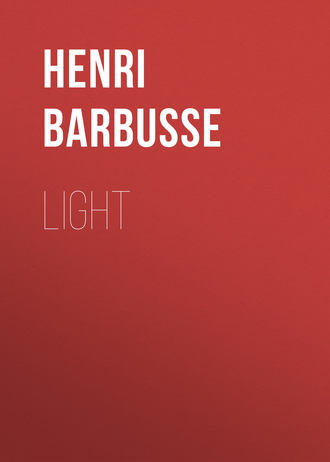 полная версия
полная версияLight
An inexorable religion has fallen from them upon us all, upholding what exists, preserving what is.
Suddenly I hear beside me, as if I were in a file of the executed, a stammering death-agony; and I think I see him who struggled like a stricken vulture, on the earth that was bloated with dead. And his words enter my heart more distinctly than when they were still alive; and they wound me like blows at once of darkness and of light.
"Men must not open their eyes!"
"Faith comes at will, like the rest!" said Adjutant Marcassin, as he fluttered in his red trousers about the ranks, like a blood-stained priest of the God of War.
He was right! He had grasped the chains of bondage when he hurled that true cry against the truth. Every man is something of account, but ignorance isolates and resignation scatters. Every poor man carries within him centuries of indifference and servility. He is a defenseless prey for hatred and dazzlement.
The man of the people whom I am looking for, while I writhe through confusion as through mud, the worker who measures his strength against toil which is greater than he, and who never escapes from hardships, the serf of these days—I see him as if he were here. He is coming out of his shop at the bottom of the court. He wears a square cap. One makes out the shining dust of old age strewn in his stubbly beard. He chews and smokes his foul and noisy pipe. He nods his head; with a fine and sterling smile he says, "There's always been war, so there'll always be."
And all around him people nod their heads and think the same, in the poor lonely well of their heart. They hold the conviction anchored to the bottom of their brains that things can never change any more. They are like posts and paving stones, distinct but cemented together; they believe that the life of the world is a sort of great stone monument, and they obey, obscurely and indistinctly, everything which commands; and they do not look afar, in spite of the little children. And I remember the readiness there was to yield themselves, body and soul, to serried resignation. Then, too, there is alcohol which murders; wine, which drowns.
One does not see the kings; one only sees the reflection of them on the multitude.
There are bemusings and spells of fascination, of which we are the object. I think, fascinated.
My lips religiously recite a passage in a book which a young man has just read to me, while I, quite a child, lean drowsily on the kitchen table—"Roland is not dead. Through long centuries our splendid ancestor, the warrior of warriors, has been seen riding over the mountains and hills across the France of Charlemagne and Hugh the Great. At all times of great national disaster he has risen before the people's eyes, like an omen of victory and glory, with his lustrous helmet and his sword. He has appeared and has halted like a soldier-archangel over the flaming horizon of conflagrations or the dark mounds of battle and pestilence, leaning over his horse's winged mane, fantastically swaying as though the earth itself were inebriate with pride. Everywhere he has been seen, reviving the ideals and the prowess of the Past. He was seen in Austria, at the time of the eternal quarrel between Pope and Emperor; he was seen above the strange stirrings of Scythians and Arabs, and the glowing civilizations which arose and fell like waves around the Mediterranean. Great Roland can never die."
And after he had read these lines of a legend, the young man made me admire them, and looked at me.
He whom I thus see again, as precisely as one sees a portrait, just as he was that evening so wonderfully far away, was my father. And I remember how devoutly I believed—from that day now buried among them all—in the beauty of those things, because my father had told me they were beautiful.
In the low room of the old house, under the green and watery gleam of the diamond panes in the lancet window, the ancient citizen cries, "There are people mad enough to believe that a day will come when Brittany will no longer be at war with Maine!" He appears in the vortex of the past, and so saying, sinks back in it. And an engraving, once and for a long time heeded, again takes life: Standing on the wooden boom of the ancient port, his scarred doublet rusted by wind and brine, his old back bellied like a sail, the pirate is shaking his fist at the frigate that passes in the distance; and leaning over the tangle of tarred beams, as he used to on the nettings of his corsair ship, he predicts his race's eternal hatred for the English.
"Russia a republic!" We raise our arms to heaven. "Germany a republic!" We raise our arms to heaven.
And the great voices, the poets, the singers—what have the great voices said? They have sung the praises of the victor's laurels without knowing what they are. You, old Homer, bard of the lisping tribes of the coasts, with your serene and venerable face sculptured in the likeness of your great childlike genius, with your three times millennial lyre and your empty eyes—you who led us to Poetry! And you, herd of poets enslaved, who did not understand, who lived before you could understand, in an age when great men were only the domestics of great lords—and you, too, servants of the resounding and opulent pride of to-day, eloquent flatterers and magnificent dunces, you unwitting enemies of mankind! You have all sung the laurel wreath without knowing what it is.
There are dazzlings, and solemnities and ceremonies, to amuse and excite the common people, to dim their sight with bright colors, with the glitter of the badges and stars that are crumbs of royalty, to inflame them with the jingle of bayonets and medals, with trumpets and trombones and the big drum, and to inspire the demon of war in the excitable feelings of women and the inflammable credulity of the young. I see the triumphal arches, the military displays in the vast amphitheaters of public places, and the march past of those who go to die, who walk in step to hell by reason of their strength and youth, and the hurrahs for war, and the real pride which the lowly feel in bending the knee before their masters and saying, as their cavalcade tops the hill, "It's fine! They might be galloping over us!" "It's magnificent, how warlike we are!" says the woman, always dazzled, as she convulsively squeezes the arm of him who is going away.
And another kind of excitement takes form and seizes me by the throat in the pestilential pits of hell—"They're on fire, they're on fire!" stammers that soldier, breathless as his empty rifle, as the flood of the exalted German divisions advances, linked elbow to elbow under a godlike halo of ether, to drown the deeps with their single lives.
Ah, the intemperate shapes and unities that float in morsels above the peopled precipices! When two overlords, jewel-set with glittering General Staffs, proclaim at the same time on either side of their throbbing mobilized frontiers, "We will save our country!" there is one immensity deceived and two victimized. There are two deceived immensities!
There is nothing else. That these cries can be uttered together in the face of heaven, in the face of truth, proves at a stroke the monstrosity of the laws which rule us, and the madness of the gods.
I turn on a bed of pain to escape from the horrible vision of masquerade, from the fantastic absurdity into which all these things are brought back; and my fever seeks again.
Those bright spells which blind, and the darkness which also blinds. Falsehood rules with those who rule, effacing Resemblance everywhere, and everywhere creating Difference.
Nowhere can one turn aside from falsehood. Where indeed is there none? The linked-up lies, the invisible chain, the Chain!
Murmurs and shouts alike cross in confusion. Here and yonder, to right and to left, they make pretense. Truth never reaches as far as men. News filters through, false or atrophied. On this side—all is beautiful and disinterested; yonder—the same things are infamous. "French militarism is not the same thing as Prussian militarism, since one's French and the other's Prussian." The newspapers, the somber host of the great prevailing newspapers, fall upon the minds of men and wrap them up. The daily siftings link them together and chain them up, and forbid them to look ahead. And the impecunious papers show blanks in the places where the truth was too clearly written. At the end of a war, the last things to be known by the children of the slain and by the mutilated and worn-out survivors will be all the war-aims of its directors.
Suddenly they reveal to the people an accomplished fact which has been worked out in the terra incognita of courts, and they say, "Now that it is too late, only one resource is left you—Kill that you be not killed."
They brandish the superficial incident which in the last hour has caused the armaments and the heaped-up resentment and intrigues to overflow in war; and they say, "That is the only cause of the war." It is not true; the only cause of war is the slavery of those whose flesh wages it.
They say to the people, "When once victory is gained, agreeably to your masters, all tyranny will have disappeared as if by magic, and there will be peace on earth." It is not true. There will be no peace on earth until the reign of men is come.
But will it ever come? Will it have time to come, while hollow-eyed humanity makes such haste to die? For all this advertisement of war, radiant in the sunshine, all these temporary and mendacious reasons, stupidly or skillfully curtailed, of which not one reaches the lofty elevation of the common welfare—all these insufficient pretexts suffice in sum to make the artless man bow in bestial ignorance, to adorn him with iron and forge him at will.
"It is not on Reason," cried the specter of the battlefield, whose torturing spirit was breaking away from his still gilded body; "it is not on Reason that the Bible of History stands. Else are the law of majesties and the ancient quarrel of the flags essentially supernatural and intangible, or the old world is built on principles of insanity."
He touches me with his strong hand and I try to shake myself, and I stumble curiously, although lying down. A clamor booms in my temples and then thunders like the guns in my ears; it overflows me,—I drown in that cry–
"It must be! It has to be! You shall not know!" That is the war-cry, that is the cry of war.
* * * * * *War will come again after this one. It will come again as long as it can be determined by people other than those who fight. The same causes will produce the same effects, and the living will have to give up all hope.
We cannot say out of what historical conjunctions the final tempests will issue, nor by what fancy names the interchangeable ideals imposed on men will be known in that moment. But the cause—that will perhaps everywhere be fear of the nations' real freedom. What we do know is that the tempests will come.
Armaments will increase every year amid dizzy enthusiasm. The relentless torture of precision seizes me. We do three years of military training; our children will do five, they will do ten. We pay two thousand million francs a year in preparation for war; we shall pay twenty, we shall pay fifty thousand millions. All that we have will be taken; it will be robbery, insolvency, bankruptcy. War kills wealth as it does men; it goes away in ruins and smoke, and one cannot fabricate gold any more than soldiers. We no longer know how to count; we no longer know anything. A billion—a million millions—the word appears to me printed on the emptiness of things. It sprang yesterday out of war, and I shrink in dismay from the new, incomprehensible word.
There will be nothing else on the earth but preparation for war. All living forces will be absorbed by it; it will monopolize all discovery, all science, all imagination. Supremacy in the air alone, the regular levies for the control of space, will suffice to squander a nation's fortune. For aerial navigation, at its birth in the middle of envious circles, has become a rich prize which everybody desires, a prey they have immeasurably torn in pieces.
Other expenditure will dry up before that on destruction does, and other longings as well, and all the reasons for living. Such will be the sense of humanity's last age.
* * * * * *The battlefields were prepared long ago. They cover entire provinces with one black city, with a great metallic reservoir of factories, where iron floors and furnaces tremble, bordered by a land of forests whose trees are steel, and of wells where sleeps the sharp blackness of snares; a country navigated by frantic groups of railway trains in parallel formation, and heavy as attacking columns. At whatever point you may be on the plain, even if you turn away, even if you take flight, the bright tentacles of the rails diverge and shine, and cloudy sheaves of wires rise into the air. Upon that territory of execution there rises and falls and writhes machinery so complex that it has not even names, so vast that it has not even shape; for aloft—above the booming whirlwinds which are linked from east to west in the glow of molten metal whose flashes are great as those of lighthouses, or in the pallor of scattered electric constellations—hardly can one make out the artificial outline of a mountain range, clapped upon space.
This immense city of immense low buildings, rectangular and dark, is not a city. They are assaulting tanks, which a feeble internal gesture sets in motion, ready for the rolling rush of their gigantic knee-caps. These endless cannon, thrust into pits which search into the fiery entrails of the earth, and stand there upright, hardly leaning so much as Pisa's tower; and these slanting tubes, long as factory chimneys, so long that perspective distorts their lines and sometimes splays them like the trumpets of Apocalypse—these are not cannon; they are machine-guns, fed by continuous ribbons of trains which scoop out in entire regions—and upon a country, if need be—mountains of profundity.
In war, which was once like the open country and is now wholly like towns—and even like one immense building—one hardly sees the men. On the round-ways and the casemates, the footbridges and the movable platforms, among the labyrinth of concrete caves, above the regiment echelonned downwards in the gulf and enormously upright,—one sees a haggard herd of wan and stooping men, men black and trickling, men issuing from the peaty turf of night, men who came there to save their country. They earthed themselves up in some zone of the vertical gorges, and one sees them, in this more accursed corner than those where the hurricane reels. One senses this human material, in the cavities of those smooth grottoes, like Dante's guilty shades. Infernal glimmers disclose ranged lines of them, as long as roads, slender and trembling spaces of night, which daylight and even sunshine leave befouled with darkness and cyclopean dirt. Solid clouds overhang them and hatchet-charged hurricanes, and leaping flashes set fire every second to the sky's iron-mines up above the damned whose pale faces change not under the ashes of death. They wait, intent on the solemnity and the significance of that vast and heavy booming against which they are for the moment imprisoned. They will be down forever around the spot where they are. Like others before them, they will be shrouded in perfect oblivion. Their cries will rise above the earth no more than their lips. Their glory will not quit their poor bodies.
I am borne away in one of the aeroplanes whose multitude darkens the light of day as flights of arrows do in children's story-books, forming a vaulted army. They are a fleet which can disembark a million men and their supplies anywhere at any moment. It is only a few years since we heard the puling cry of the first aeroplanes, and now their voice drowns all others. Their development has only normally proceeded, yet they alone suffice to make the territorial safeguards demanded by the deranged of former generations appear at last to all people as comical jests. Swept along by the engine's formidable weight, a thousand times more powerful than it is heavy, tossing in space and filling my fibers with its roar, I see the dwindling mounds where the huge tubes stick up like swarming pins. I am carried along at a height of two thousand yards. An air-pocket has seized me in a corridor of cloud, and I have fallen like a stone a thousand yards lower, garrotted by furious air which is cold as a blade, and filled by a plunging cry. I have seen conflagrations and the explosions of mines, and plumes of smoke which flow disordered and spin out in long black zigzags like the locks of the God of War! I have seen the concentric circles by which the stippled multitude is ever renewed. The dugouts, lined with lifts, descend in oblique parallels into the depths. One frightful night I saw the enemy flood it all with an inexhaustible torrent of liquid fire. I had a vision of that black and rocky valley filled to the brim with the lava-stream which dazzled the sight and sent a dreadful terrestrial dawn into the whole of night. With its heart aflame Earth seemed to become transparent as glass along that crevasse; and amid the lake of fire heaps of living beings floated on some raft, and writhed like the spirits of damnation. The other men fled upwards, and piled themselves in clusters on the straight-lined borders of the valley of filth and tears. I saw those swarming shadows huddled on the upper brink of the long armored chasms which the explosions set trembling like steamships.
All chemistry makes flaming fireworks in the sky or spreads in sheets of poison exactly as huge as the huge towns. Against them no wall avails, no secret armor; and murder enters as invisibly as death itself. Industry multiplies its magic. Electricity lets loose its lightnings and thunders—and that miraculous mastery which hurls power like a projectile.
Who can say if this enormous might of electricity alone will not change the face of war?—the centralized cluster of waves, the irresistible orbs going infinitely forth to fire and destroy all explosives, lifting the rooted armor of the earth, choking the subterranean gulfs with heaps of calcined men—who will be burned up like barren coal,—and maybe even arousing the earthquakes, and tearing the central fires from earth's depths like ore!
That will be seen by people who are alive to-day; and yet that vision of the future so near at hand is only a slight magnification, flitting through the brain. It terrifies one to think for how short a time science has been methodical and of useful industry; and after all, is there anything on earth more marvelously easy than destruction? Who knows the new mediums it has laid in store? Who knows the limit of cruelty to which the art of poisoning may go? Who knows if they will not subject and impress epidemic disease as they do the living armies—or that it will not emerge, meticulous, invincible, from the armies of the dead? Who knows by what dread means they will sink in oblivion this war, which only struck to the ground twenty thousand men a day, which has invented guns of only seventy-five miles' range, bombs of only one ton's weight, aeroplanes of only a hundred and fifty miles an hour, tanks, and submarines which cross the Atlantic? Their costs have not yet reached in any country the sum total of private fortunes.
But the upheavals we catch sight of, though we can only and hardly indicate them in figures, will be too much for life. The desperate and furious disappearance of soldiers will have a limit. We may no longer be able to count; but Fate will count. Some day the men will be killed, and the women and children. And they also will disappear—they who stand erect upon the ignominious death of the soldiers,—they will disappear along with the huge and palpitating pedestal in which they were rooted. But they profit by the present, they believe it will last as long as they, and as they follow each other they say, "After us, the deluge." Some day all war will cease for want of fighters.
The spectacle of to-morrow is one of agony. Wise men make laughable efforts to determine what may be, in the ages to come, the cause of the inhabited world's end. Will it be a comet, the rarefaction of water, or the extinction of the sun, that will destroy mankind? They have forgotten the likeliest and nearest cause—Suicide.
They who say, "There will always be war," do not know what they are saying. They are preyed upon by the common internal malady of shortsight. They think themselves full of common-sense as they think themselves full of honesty. In reality, they are revealing the clumsy and limited mentality of the assassins themselves.
The shapeless struggle of the elements will begin again on the seared earth when men have slain themselves because they were slaves, because they believed the same things, because they were alike.
I utter a cry of despair and it seems as if I had turned over and stifled it in a pillow.
* * * * * *All is madness. And there is no one who will dare to rise and say that all is not madness, and that the future does not so appear—as fatal and unchangeable as a memory.
But how many men will there be who will dare, in face of the universal deluge which will be at the end as it was in the beginning, to get up and cry "No!" who will pronounce the terrible and irrefutable issue:—
"No! The interests of the people and the interests of all their present overlords are not the same. Upon the world's antiquity there are two enemy races—the great and the little. The allies of the great are, in spite of appearances, the great. The allies of the people are the people. Here on earth there is one tribe only of parasites and ringleaders who are the victors, and one people only who are the vanquished."
But, as in those earliest ages, will not thoughtful faces arise out of the darkness? (For this is Chaos and the animal Kingdom; and Reason being no more, she has yet to be born.)
"You must think; but with your own ideas, not other people's."
That lowly saying, a straw whirling in the measureless hand-to-hand struggle of the armies, shines in my soul above all others. To think is to hold that the masses have so far wrought too much evil without wishing it, and that the ancient authorities, everywhere clinging fast, violate humanity and separate the inseparable.
There have been those who magnificently dared. There have been bearers of the truth, men who groped in the world's tumult, trying to make plain order of it. They discover what we did not yet know; chiefly they discover what we no longer knew.
But what a panic is here, among the powerful and the powers that be!
"Truth is revolutionary! Get you gone, truth-bearers! Away with you, reformers! You bring in the reign of men!"
That cry was thrown into my ears one tortured night, like a whisper from deeps below, when he of the broken wings was dying, when he struggled tumultuously against the opening of men's eyes; but I had always heard it round about me, always.
In official speeches, sometimes, at moments of great public flattery, they speak like the reformers, but that is only the diplomacy which aims at felling them better. They force the light-bearers to hide themselves and their torches. These dreamers, these visionaries, these star-gazers,—they are hooted and derided. Laughter is let loose around them, machine-made laughter, quarrelsome and beastly:—
"Your notion of peace is only utopian, anyway, as long as you never, any day, stopped the war by yourself!"
They point to the battlefield and its wreckage:—
"And you say that War won't be forever? Look, driveler!"
The circle of the setting sun is crimsoning the mingled horizon of humanity:—
"You say that the sun is bigger than the earth? Look, imbecile!"
They are anathema, they are sacrilegious, they are excommunicated, who impeach the magic of the past and the poison of tradition. And the thousand million victims themselves scoff at and strike those who rebel, as soon as they are able. All cast stones at them, all, even those who suffer and while they are suffering—even the sacrificed, a little before they die.
The bleeding soldiers of Wagram cry: "Long live the emperor!" And the mournful exploited in the streets cheer for the defeat of those who are trying to alleviate a suffering which is brother to theirs. Others, prostrate in resignation, look on, and echo what is said above them: "After us the deluge," and the saying passes across town and country in one enormous and fantastic breath, for they are innumerable who murmur it. Ah, it was well said:







